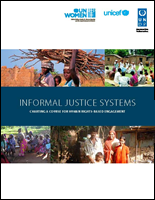Informal Justice Systems: Charting a Course for Human Rights-based Engagement
Informal Justice Systems: Charting a Course for Human Rights-Based Engagement is a study that has been jointly commissioned by UNDP, UNICEF and UN Women. It is the first comprehensive assessment that has been conducted of informal justice systems and human rights protection. To enable more effective engagement that enhances access to justice and the protection of human rights, the Study involved an exhaustive literature review and country-specific case studies in Bangladesh, Ecuador, Malawi, Niger, Papua New Guinea and Uganda, as well as a desk study of 12 additional countries.
The Study establishes a typology for informal justice systems, recognizing the diversity and complexity of non-state mediation and decision-making by customary and traditional systems, and finds that most contain varying mixtures of elements of formality and informality. Drawing on the analysis of these systems’ practice, it reviews in particular issues of concern for the protection of women’s and children’s rights.
The most innovative part of the Study is its framework for development engagement in informal justice systems to improve human rights protection and access to justice. Based on a comprehensive assessment of programming interventions to date, the study identifies the most promising strategies for bringing informal justice systems into greater alignment with human rights requirements. It also finds that effective programming in this area is highly context-specific, and that engaging with the cultural practices that are entrenched in informal justice systems demands a multi-pronged and long term human rights-based approach, that is carefully aligned with local communities’ own priorities.






